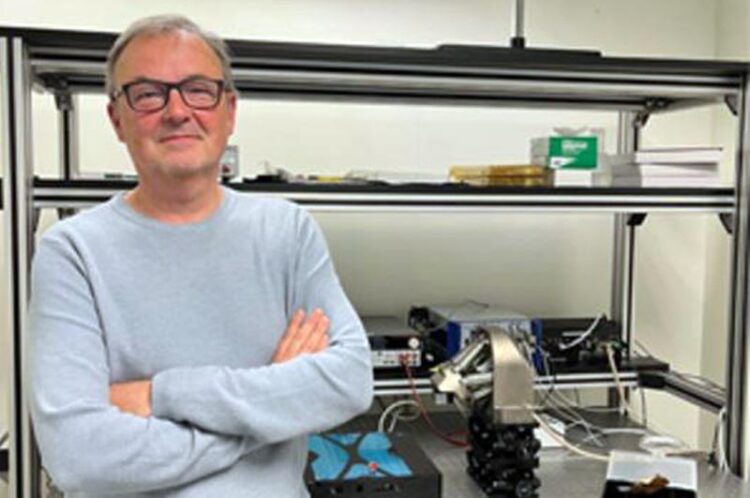A chip unique in the world

Researcher José Capmany
Credit: UPV
A team from UPV and iPRONICS has manufactured the first universal, programmable and multifunctional photonic chip on the market.
A team from the Photonics Research Laboratory (PRL)-iTEAM of the Universitat Politècnica de València and the company iPRONICS have designed and manufactured a revolutionary chip for the telecommunications sector, data centers and infrastructure associated with artificial intelligence computing systems. It is the first universal, programmable and multifunctional photonic chip worldwide. It will benefit 5G communications, data centres, quantum computing, artificial intelligence, satellites, drones and autonomous driving, among many other applications.
The development of this revolutionary chip is the main result of the European project UMWP-Chip, led by researcher José Capmany and funded by an ERC Advanced Grant from the European Research Council. The work has been published in the Nature Communications journal.
The chip devised and manufactured by the UPV and iPRONICS team allows on-demand programming and interconnecting wireless and photonic segments of communication networks, avoiding the generation of bottlenecks that can limit both the capacity and bandwidth available.
“It is the first chip in the world with these characteristics. It can implement the twelve basic functionalities required by these systems and can be programmed on demand, thus increasing the efficiency of the circuit,” explains Capmany.
The UPV professor, an international reference in the field of photonics, explains that applications such as 5G or autonomous cars require a higher frequency, making it necessary to reduce the size of the antennas and the associated circuits. In this case, the PRL-iTEAM from UPV has managed to make the converter behind the antenna, an interface chip, as tiny and compact as possible and ready to support current and expected future frequency bands.
This chip has already been integrated into an iPRONICS product, the Smartlight, and Vodafone has already used it in testing.
“For us, the development of this chip is a crucial step because it has allowed the validation of our developments applied to a growing problem, the efficient management of data flows in data centers and networks for artificial intelligence computing systems. Our next goal is to scale the chip to meet the needs of this market segment,” said Daniel Pérez-López, co-founder and CTO of iPronics.
Journal: Nature Communications
DOI: 10.1038/s41467-024-45888-7
Method of Research: Meta-analysis
Subject of Research: Not applicable
Article Title: General-purpose programmable photonic processor for advanced radiofrequency applications
Article Publication Date: 20-Feb-2024
Media Contact
Luis Zurano
Universitat Politècnica de València
ciencia@upv.es
Office: 34-963-877-842 x71038
All latest news from the category: Information Technology
Here you can find a summary of innovations in the fields of information and data processing and up-to-date developments on IT equipment and hardware.
This area covers topics such as IT services, IT architectures, IT management and telecommunications.
Newest articles

First-of-its-kind study uses remote sensing to monitor plastic debris in rivers and lakes
Remote sensing creates a cost-effective solution to monitoring plastic pollution. A first-of-its-kind study from researchers at the University of Minnesota Twin Cities shows how remote sensing can help monitor and…

Laser-based artificial neuron mimics nerve cell functions at lightning speed
With a processing speed a billion times faster than nature, chip-based laser neuron could help advance AI tasks such as pattern recognition and sequence prediction. Researchers have developed a laser-based…

Optimising the processing of plastic waste
Just one look in the yellow bin reveals a colourful jumble of different types of plastic. However, the purer and more uniform plastic waste is, the easier it is to…



